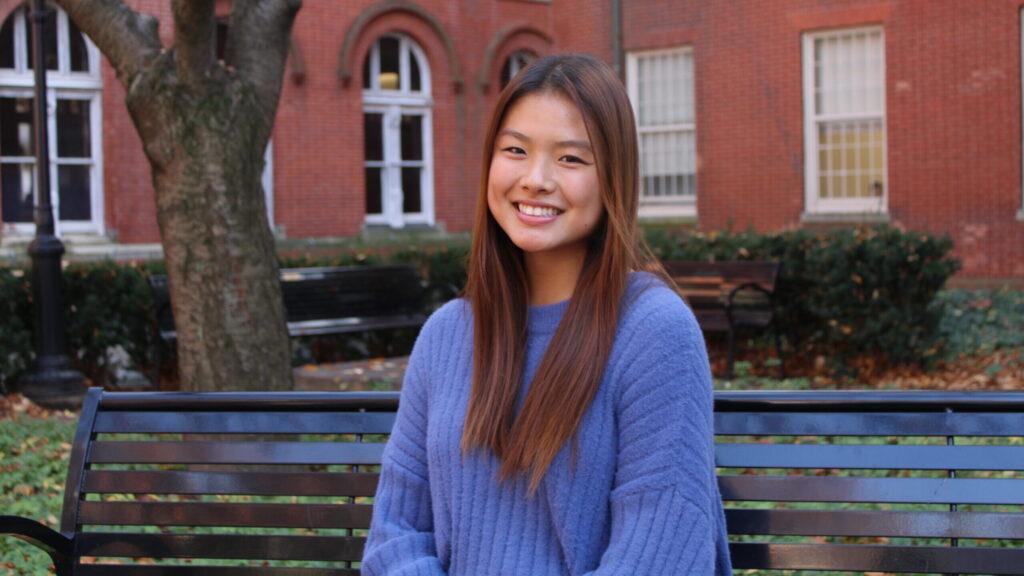Leah Chen (CAS ’25) placed third in the 2023 District of Columbia Space Grant Consortium Student Research Poster Contest. Chen was notified Feb. 13, 2023, about the award for her work focusing on the use of novel nanoparticles to improve treatment for acute kidney injury (AKI) before the winners were announced publicly earlier this week.
NASA funded Chen’s research during the summer of 2022 by a Space Grant from the Space Grant Consortium, which aims to support undergraduate research focused on science and engineering. Chen has researched AKI since her first year at Georgetown University.
“I knew I wanted to focus on something more biomedical. So I reached out to my dean, and she got me connected to Professor Van Keuren by the second week of school,” Chen said.

AKI is one of the most prevalent major post-surgical complications for open-heart surgery. According to Georgetown physics professor Edward Van Keuren, this is because open-heart surgery exposes the body to excess hydrogen peroxide, which can result in severe bodily tissue damage and cause kidney failure.
“You normally have a little bit of hydroperoxide in your body, but if you’re undergoing surgery, or if you’re wounded, your body tends to react by overproducing it,” Van Keuren told the Hoya.
The treatment that Chen has been researching, known as APP-103, both reduces hydrogen peroxide concentration and produces anti-inflammatory agents. It therefore works twofold in fighting against AKI.
“We’re trying to find a way to better quantify the way that the reaction happens,” Chen said.
At Georgetown, Chen is pursuing the pre-med track with a major in physics and a minor in public health.
Chen said that although chemistry and biology are traditionally majors for students hoping to enter into M.D. programs after they graduate, she found physics to be the most engaging of the hard sciences, particularly because of the field’s lack of rogue memorization and focus on problem-solving skills.
“In high school, I remember physics was one of the classes that really challenged me, and it was a lot more rewarding when I did well in it,” Chen said.
Chen said she maintains a fondness for many childhood memories of sitting in her father’s office, listening to him speak passionately about his work and caring for his patients. Chen’s father earned his doctorate in physics but later entered the medical field, according to Chen.
Chen said she hopes to combine her passions for physics and medicine and work as a physician in the future.
“I just clicked really well with the subject, and the physics department at Georgetown is amazing. I cannot imagine majoring in anything else, as cheesy as that sounds,” Chen said.
Chen said that because of the novelty of her work, bringing the technique into the realm of physical science has not been without its difficulties.
“Over the summer, we went through a huge period of getting really bad data and having to figure out, ‘Why is this data looking so terrible?’” Chen said.
Chen said she spent the past summer altering the parameters of her experiment, slowly working toward more conclusive results.
Chen has shown remarkable dedication in her perseverance and mastery of her complex research of AKI, according to Van Keuren. Notably, her research involves the use of isothermal titration calorimetry, a technique traditionally used in the field of biology to measure the heat of reactions. Chen’s work has focused on novel application of the technique to physical science research.
“We don’t have any experts locally who know how to use it. We don’t have a lot of experience using it and so Chen’s had the chance to kind of become the local expert on how to get good data out of it,” Van Keuren said.
Eleni Hughes (GRD ’23), a doctoral candidate for physics and member of the Van Keuren lab, said she is impressed with Chen’s work.
“When you’re developing something new, which [Chen’s] trying to do, there’s no sort of pre-scripted technique, there’s no paper online that you can just follow,” Hughes said.
During her remaining time at Georgetown, Chen said she looks forward to continuing her research and hopes to obtain even more conclusive results. Chen said she plans to work in the Van Keuren lab this summer, hopefully to begin putting together a paper about her work for publication in a scientific journal.
Van Keuren said he is proud of Chen’s dedication to her research — and looks forward to the work she will be doing in the future in his lab.
“I think the next step is just continuing on with what I’ve been doing, reaching out to more people in the field, seeing if they have any opinions or suggestions on how to improve because it’s very much still like a work in progress,” Chen said.
“I’m deeply honored to have received this award. This research is really new and exciting, and it feels rewarding to have it highlighted and shared with a greater audience,” Chen said.







